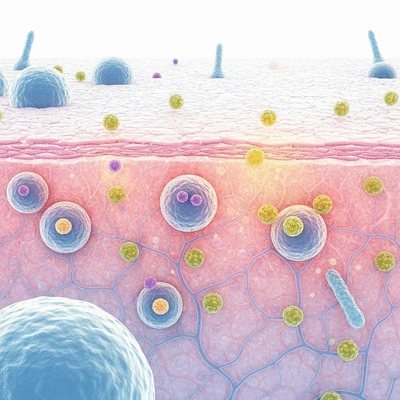Common Allergy Triggers
- ● Environmental: Pollen, Dust Mites, Mold
- ● Chemical: Household Products, Cosmetics
- ● Biological: Pets, Certain Foods
- ● Contact: Fabrics, Materials
Have you ever felt an unexpected itch or rash after using a new skincare product? For many, skin allergies can be a perplexing and uncomfortable experience. Understanding the triggers and mechanisms behind these reactions is crucial for effective management and relief.
This visual highlights the key aspects of skin allergies, categorizing common triggers and explaining the immune system's role in their manifestation.
Skin allergies can be quite bothersome, affecting not just our physical appearance but also our overall comfort and well-being. Understanding skin allergies is the first step towards effective management and relief. They are the result of the immune system reacting to substances that are typically harmless, leading to various symptoms that can range from mild to severe. In this section, we'll explore what skin allergies are, how they work, and their common triggers.
Skin allergies occur when your immune system mistakenly identifies a harmless substance as a threat. This miscommunication can lead to a variety of skin reactions, including rashes, swelling, and irritation. When your skin comes into contact with an allergen, your body's immune response kicks in, releasing chemicals like histamine that cause inflammation and other symptoms. According to the Asthma and Allergy Foundation of America (AAFA), allergic skin conditions are among the most common allergic diseases.
Each of these types presents differently, and understanding their distinctions can help you identify what you're experiencing. If you notice any unusual skin changes, it's essential to take note and consider what may have triggered them.
Your immune system plays a critical role in how skin allergies manifest. When you’re exposed to an allergen, your body releases histamines and other chemicals to protect itself. This can lead to inflammation, redness, and itching. It’s fascinating to think that what your body perceives as harmful can often be everyday substances, like soap or even pollen from flowers!
Understanding this immune response is crucial for identifying and managing skin allergies effectively. If you notice symptoms arising after exposure to certain products or environments, tracking those reactions can be invaluable for your health. The American College of Allergy, Asthma & Immunology (ACAAI) provides further insights into various skin allergies and their immune responses.
Identifying what triggers your skin allergies is essential for preventing future reactions. Various allergens can provoke skin sensitivities, and understanding them can empower you to make informed choices. Here are some common causes you should be aware of:
By being aware of these triggers, you can take proactive steps to minimize exposure and manage your symptoms more effectively. The prevalence of skin allergies highlights the importance of trigger identification, with data from the CDC indicating a significant number of individuals affected.
Did you know? Keeping a detailed allergy diary can be a game-changer in managing your skin allergies. By tracking your symptoms and potential triggers, you can identify patterns that will help you avoid allergens and seek appropriate treatment.
Here are some common questions about skin allergies to help you better understand and manage your condition:
As we've explored, skin allergies can stem from a variety of triggers, causing discomfort and distress for many. The key to managing these allergies lies in understanding their causes and recognizing the symptoms that accompany them. Whether it's environmental factors, chemical irritants, or biological allergens, awareness is the first step towards effective management.
To recap, we discussed the common causes of skin allergies, including:
In addition, we highlighted symptoms such as rashes, itching, and redness, which serve as vital signals from your body. Recognizing these can help you take appropriate action and seek help when necessary.
Managing skin allergies proactively is crucial for maintaining your overall skin health. By taking steps such as identifying allergens, practicing good skin care, and using suitable topical treatments, you can significantly reduce the impact of allergies on your daily life. Don't hesitate to consult with a specialist if you're facing persistent challenges; advanced options are available to help you regain control.
As someone who has worked extensively with allergy sufferers, I can attest to the importance of a tailored approach. Every individual’s experience with allergies is unique, and finding what works best for you is essential. Here are a few proactive strategies to consider:
I invite you to join our community at What Are Allergies. Sharing your experiences not only helps others but also fosters a supportive environment where we can learn from one another. Have you faced challenges with skin allergies? What strategies have you found helpful? Let's come together to share insights and empower one another in our journeys toward better skin health!
Your voice matters, and together we can create a resourceful space for all those impacted by allergies. Remember, understanding your condition is the key to effective management!
Here is a quick recap of the important points discussed in the article:


